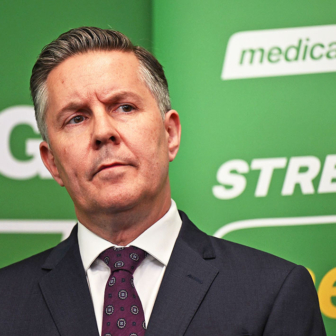IT BEGAN as an American political controversy, provoked by a collection of Republican desperadoes who have been holed up in a political Alamo since last November. Faced with President Obama’s health plan, they quickly saw a way of shootin’ their way outa’ there, and weren’t too fussy about who was caught in the cross-fire. On the way through, the issue promised to provide the equally besieged Labour government in Britain with a much-needed rallying point, and to reveal divisions within a Conservative Party apparently heading for an easy victory at the next election.
In the end, it was business as usual. The political cream pie has not yet been baked that doesn’t land squarely in the face of Gordon Brown and Labour, or at least splatter messily all over them.
I’m talking, of course, about the recent brawl over Britain’s National Health Service, the NHS. Now, there’s nothing unusual about a trans-Atlantic political stoush. But President Obama’s efforts to reform America’s shambolic healthcare system, which leaves millions of the poorest and most vulnerable completely uninsured, took the strangest of turns when its Republican opponents decided to use the venerable NHS as their whipping boy.
Americans heard a great deal of nonsense from this deeply conservative rump, most of it calculated to appeal to the ignorant, the insular and the downright paranoid. The most spectacular example was the lie, advanced by Sarah Palin among others, that Britain has “death panels” that make decisions about whether people are allowed access to treatment for life-threatening conditions. In this country, it’s various folks across the Channel who are normally accused of trendy policies in this line, if not this extreme – lately, the Swiss tolerance of assisted suicide – so it was an unaccustomed and initially uncomfortable experience for Britain’s politicians and diplomats to be on the receiving end of such accusations.
And Brown and Co seemed initially uncertain about what to say and do about it all. Do you go into bat for Britain’s glorious NHS, and thereby risk entering a political punch-up where who knows what might come back to bite you – especially when the most powerful force in the US media and the Captain of International Team Neocon, Citizen Murdoch – just happens to own four local rags here with a combined readership of several millions?
Britons otherwise inclined to grumble about the NHS – as they might grumble about the trains, the buses, the schools, the plumber or the price of fish – suddenly came out of the woodwork doughtily defending their revered health service. Mr and Mrs Brown themselves led this effort in collective back-slapping; for a few days, tales of the “How the NHS Saved My Left Arm” variety squeezed out the usual run of bad news stories for the government. It was as if those awful Yanks had laid the boot into tea and scones, the chip butty or Paddington Bear. The NHS’s Welsh socialist “father,” Aneurin Bevan, would have been delighted that loyal affection for his progeny was now as patriotic as Land of Hope and Glory and as British as a Night at the Proms.
It’s not that the NHS’s defenders are unaware of its problems. Much like the Australian health system, the NHS faces the difficulties of spiralling costs for drugs and treatment, an ageing population, hospitals creaking under the pressures of high demand and inadequate funding, and shortages of doctors and nurses. You don’t need to spend much time absorbed in the British media to see stories of poor care. People do indeed die in British hospitals because of poor hygiene and incompetent treatment.
The system naturally has its local critics, some even prepared to send it packing. Karol Sikora, a cancer specialist and dean of the University of Buckingham Medical School, declared in the pages of the Observer at the height of the controversy that “single-provider, single-payer, tax-based health systems are doomed.” They were becoming ever more expensive, he said, and taxpayers now found themselves supporting a “new gerontocracy” on whom most health costs are spent, yet who pay little tax. Monopolies were always inefficient. “Make no mistake,” Sikora warned, “All these guys care about is your vote, not your health.”
This was a harsh finding on both the NHS and Britain’s politicians, but it at least had the virtue of raising some of the real challenges faced by the British health system. Yet the verdict of the media controversy here seems to be that on most measures the British system compares favourably with the American. On key points, such as equity and fairness, it does rather better.
Some British critics of the conservative American campaign have pointed to the major difference between the two systems: if they get ill or injure themselves, British people don’t need to worry that they’ll go broke, or lose their home, or simply be unable to afford the treatment they need. Americans do.
My own family’s contact with the NHS has so far, happily, been insubstantial. It’s initially a surprise to have to register with a particular surgery, and then – unlike in Australia – to have to see a doctor at that clinic, and not some other whom we might choose to consult, when you’re ill. But it’s reassuring to know that, in the event of a serious illness or injury, we’ll be looked after. When we’ve sought help, we found it readily enough. Our daughter received prompt and careful attention in the emergency section of our local hospital when she fell off some play equipment and landed on her head. We’ve had the occasional visitor through London over the last year who has become seriously ill, and it’s been the same story. They’ve been well cared for by local doctors and hospitals, and then sent on their way. The worst that one of them had to endure at the hands of the NHS was being laughed at when his wife informed the staff on the front desk that her sick husband was an Australian and his name – echoing the Monty Python sketch – was Bruce.
The Conservative leader, David Cameron, is on record as a strong supporter of the NHS, being especially grateful for the support it gave his severely disabled son. His gratitude is unquestionably heartfelt, but also fits in neatly with the new image he and his closest allies wish to promote. Instead of the nasty party of Thatcherite confrontation, the new Tories like to promote themselves as hip and “progressive.” Sure, the fact that there are a few Eton and Oxbridge types still running the show, and that the Tories might have recently promised to lift the threshold on inheritance tax to a whopping £1 million, hardly seems the epitome of either meritocracy or progressivism. Nor does the disreputable company the British Conservative Party has been keeping among European right-wing parties in the European parliament. But George Osborne, the shadow chancellor, is doing his best to paint the Tories as the scourge of the irresponsible and greedy banker and the City “bonus” culture, and Cameron has promised to cut ministerial salaries as a good example to the rest of us.
So, in the context of this effort to recast the Tory Party’s image, the intervention in the NHS debate of the man who has recently emerged as the American right’s favourite British Tory, Daniel Hannan, was very unwelcome. Hannan, a member of the European parliament, appeared on Fox news warning the Americans against adopting the sixty-year mistake which he believes the NHS to be. While Cameron quickly moved to dismiss Hannan as an “eccentric” who failed to articulate the real views of the Tory Party, journalists had no difficulty at all finding other senior Tories who, in the past, had put their names to documents slagging off the NHS. They, too, now sought to distance themselves from Hannan. But the damage seemed already to have been done, and Labour ministers gleefully pointed to the division in Tory ranks while hinting darkly at a hidden agenda to get rid of the NHS once the Conservatives were back in office. They do have a point; Cameron is clearly regarded as a softie – too Blairite by half – by a large and powerful section of the Tory Party who would prefer a more vigorous free market agenda for a future Conservative government.
In real terms at present, the differences between Tory and Labour policy on the NHS seem very slight. The Conservatives advocate an independent NHS board and reduced scope for what they call “ministerial meddling.” They want to introduce into the system greater local autonomy and scope for competition, as a means of increasing efficiency. But Labour is also committed to competition, and both parties support the fundamental principle of a universal taxpayer-funded NHS that is free to patients at the point of delivery: the very kind of arrangement that US conservatives claim will destroy the liberties bequeathed by the founding fathers.
And what do British voters think of it all? A recent poll found that more respondents thought the Tories would improve the NHS than thought they would make it worse, and almost half of those polled believed a Conservative government would actually bring about better healthcare. Labour’s warnings about what the Tories would do to the NHS were widely disbelieved. It was as if “I Love the NHS Week” had never been held. The government seemed to have gained nothing from all those expressions of goodwill towards the service, or from the Tory stumbling over the issue.
Worse still, the government was quickly becoming engulfed by yet another issue with a strong Anglo-American dimension: the early release from a Scottish gaol of the only man to be prosecuted for the bombing of the Pan Am flight over Lockerbie. The Libyan prisoner, Abdelbaset al-Megrahi, was dying of cancer, and the Scottish government agreed to release him on compassionate grounds. It was the Scottish justice minister, Kenny MacAskill, who initially took most of the heat for this very difficult decision; and in a very brave, responsible and dignified manner, I thought, although he was widely censured for both the decision itself and his efforts to explain the reasons for it. Some of the most intense criticism came from Americans, ranging from understandably angry families of the passengers, through the head of the FBI, to President Obama himself. But there were suspicions that another Scotsman, Gordon Brown, and his foreign secretary, David Miliband, had also been working behind the scenes, perhaps even entering into some grubby trade-related deal with Muammar Gaddafi for the convicted bomber’s release. The government has vehemently denied such claims.
Whatever the truth of that matter – and the issue is still playing out in the media here as I write – we can be certain that the Labour government will emerge from the affair wearing the usual cream pie, however honourable its motives and actions. •




